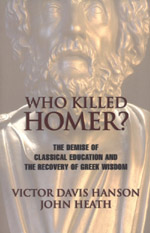 (Reprinted with permission from the Washington Post Book World, Camille Paglia.)
(Reprinted with permission from the Washington Post Book World, Camille Paglia.)
Bullets are still flying in the culture wars of the last decade, but the front has changed. As costs rise and competition for students intensifies, administrators are taking increased control of curricular matters from often bitterly factionalized faculties. By terminating or transferring vacated faculty positions and by relying on poorly paid part-time instructors, many institutions are being reshaped by purely economic criteria. Among humanities programs, classics departments have been the most vulnerable to drastic downsizing and outright annihilation.
Victor Davis Hanson is professor of Greek at California State University in Fresno, and John Heath is chairman of the classics department at Santa Clara University. In Who Killed Homer? The Demise of Classical Education and the Recovery of Greek Wisdom, Hanson and Heath demonstrate in riveting detail the actual scale of the threat to Greco-Roman studies in the United States.
Who Killed Homer? is a blistering indictment not just of administrators, who must meet the bottom line, but of classicists themselves, who ignored the developing crisis over the past thirty years. Instead of reaching out to the general public to defend the classics, many professors withdrew into insular academic conferences and narrow, “obscurantist” scholarship. Surveying recent academic critiques, Hanson and Heath suggest that the media’s false portrayal of the culture wars as a quarrel between tolerant liberals and reactionary conservatives has helped the most ruthless campus careerists, who gained major professorships with huge salaries and reduced teaching loads by espousing a fashionable leftism.
Hanson and Heath eloquently assail the systematic denigration of Western culture in prevailing campus “trend, cant, and fad”: “Why do few professors of Greek and Latin teach us that our present Western notions of constitutional government, free speech, individual rights, civilian control over the military, separation between religious and political authority, middle-class egalitarianism, private property, and free scientific inquiry are both vital to our present existence and derive from the ancient Greeks?”
Sternly rebutting misleadingly rosy pictures of classics studies, Hanson and Heath show that, from 1962 to 1976, the number of high school students studying Latin “plunged 80 percent” and has never recovered. Decline is also clear at the college level: “Of over one million B.A.s awarded in 1994, only six hundred were granted in classics.” Yet classics professors themselves merrily spin on. Since 1962, “twice as many scholars now publish 50 percent more material in twice as many journals.”
Hanson and Heath point out that enthusiasts and amateurs, not professional classicists, made the great breakthroughs in our understanding of the ancient world, from Heinrich Schliemann, the discoverer of Troy, to Milman Parry, who established the Homeric oral tradition, and Michael Ventris, who cracked the code of Linear B, the Minoan script.
The remedies offered by Hanson and Heath are based on “classics as a core curriculum.” They laud the intellectual challenge of the study of ancient Greek, where the verb has over 350 forms. They provide a thematic teaching guide to Homer and a reading list of recommended scholarly works of unimpeachable quality.
The authors’ proposals for academic reform are intended to reawaken a sense of professional ethics and to reorient universities toward undergraduate teaching. These include ending the exploitation of graduate students as “helot” teaching assistants; abolishing doctoral dissertations; dismantling tenure in favor of five-year contracts; and cutting off subsidies for travel to conferences.
Hanson and Heath are perhaps too focused on American abuses; some broader consideration of still-vital classical studies in Europe and Great Britain would have been useful. The authors’ portrait of popular culture is excessively bleak, and I was distressed by their skepticism about psychoanalytic criticism and even undergraduate study of Egyptian art.
However, Who Killed Homer? is the most substantive by far of the academic critiques that have appeared in the past fifteen years. This passionate protest, with its wealth of facts and its flights of savage indignation, is a must-read for anyone interested in the future of higher education in the United States.
Appetizer
Greeks, Not Classicists
So many Ph.D.’s in Classics, so little employment. So little teaching of the Greeks, so much writing about them to so few. So many new approaches, so many new theories, so many cleverly entitled talks, books, articles, and panels; and still almost no jobs—because there are almost no students—because there is really no interest in the Greeks in or out of the university. So much effort for so few, so little for so many. If only we who teach the classical worlds had as many undergraduates—or just interested Americans—as there are professors and graduate students! But then we would need people who think and act like Greeks, not Classicists, to teach us about Greece.
—from Who Killed Homer?